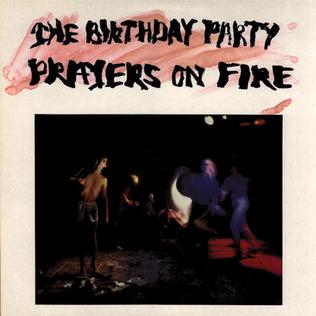Top Qs
Timeline
Chat
Perspective
Prayers on Fire
1981 studio album by the Birthday Party From Wikipedia, the free encyclopedia
Remove ads
Prayers on Fire is the debut studio album by Australian rock group the Birthday Party, released on 6 April 1981 on the Missing Link label in Australia, later licensed to the 4AD label. This was the band's first full-length release on an international record label and the first after changing the group's name from the Boys Next Door to the Birthday Party. It was recorded at Armstrong's Audio Visual Studios in Melbourne and Richmond Recorders in the nearby suburb of Richmond, between December 1980 and January 1981.
Remove ads
Background
Summarize
Perspective
In February 1980 Melbourne-based new wave group, the Boys Next Door, changed their name to the Birthday Party.[1] They consisted of the same lineup of Phill Calvert on drums, Nick Cave on vocals, Mick Harvey on guitar and organ, Rowland S. Howard on guitar and Tracy Pew on bass guitar.[1] They relocated to London and signed with the 4AD label which issued the extended play, The Friend Catcher in the United Kingdom. In July, their Australian label, Missing Link Records, released "Mr Clarinet" from the EP as a single.[1] In November, Missing Link released the album, The Birthday Party / The Boys Next Door, which combined previously unreleased material with tracks that has been issued under the Boys Next Door name.[1]
Also in November 1980, the Birthday Party returned to Australia and toured.[1] According to Australian music historian, Ian McFarlane, "It was during this time that the band cemented its reputation as a peerless live act, with its omnipresent influence settling over the Melbourne scene".[1] On 6 April 1981 they issued the album and followed in June with its lead single, "Nick the Stripper".[1] The group returned to London.[1]
Members of Melbourne post-punk band Equal Local contributed the brass section to "Nick the Stripper" – tenor saxophonist Mick Hauser was mis-credited as "Mick Hunter". Equal Local had formed in 1980 by Dean Richards on guitar, Philip Jackson on synthesisers, trumpet and rhythm generator, Melissa Webb on synthesiser and piano, Bryce Perrin on acoustic bass, and Hauser.[2] Richards and Jackson were bandmates from the post-punk group Whirlywirld and contemporaries of the Boys Next Door.[2] Equal Local disbanded in early 1982.[2]
Remove ads
Composition and recording
In Melbourne, in December 1980 and January 1981, they joined engineer and producer, Tony Cohen, in Armstrong's Audio Visual Studios (A.A.V. Studio 2) and Richmond Recorders, to record their tracks.[1] Music journalist Toby Creswell noted that the band "struggled with creating their own identity some of them also began indulging an appetite for alcohol and heroin".[3] Cave was embarrassed by "Zoo Music Girl" but noted "we were digging for something and we kind of just found it with some songs" and cited "King Ink" as an example of "a certain kind of sound that we wanted to work with on records after that".[3] Eight of the eleven tracks on Prayers on Fire were written or co-written by Cave, "[it] was a kind of reaction to the major disappointments we felt when we went to England... [we] began to see a vision and I don't think we were positively influenced ... we didn't want to be like the English New Wave pop groups of the time".[3] Pew observed "[it] stinks, quite honestly ... The engineer slept through the entire session for a start".[3]
Remove ads
Reception
Summarize
Perspective
About.com's Anthony Carew felt Prayers on Fire was able to "capture the qualities of their infamous live-shows on record ... the evocatively-produced set dared dress key cuts in blaring brass; giving a sense of perverted-cabaret to their mordant racket, turning Cave from nihilist, self-destructive savant to theatrical, flamboyant showman".[4] AllMusic's Greg Maurer found "a fascination with the dark, (self-)destructive side of religion is more than evident in his later work... While there might not be any of the explicit Biblical imagery on [the album] that Cave would later ejaculate, the title ... is apt".[5] Ian McFarlane stated it showed the band was "irrevocably and unashamedly changing for the better, being more aggressive than anything they had ever recorded".[1] SoundStageDirect described it as "a creepy carnival of tribal rhythms, wonky discordance and garbled surrealism".[14] Music critic Ed St John summarised, "this is an expression which ebbs out beyond the confines of proficiently played music ... [it] is akin to watching a film of Jackson Pollock painting or listening to Dylan Thomas in full alcoholic flight".[3]
The track "Ho-Ho" is featured in the 2004 German film Head-On.
Accolades
Remove ads
Track listing
Remove ads
Personnel
- The Birthday Party members[23]
- Nick Cave – lead vocals, piano (track 7), saxophone (track 9), drums (track 11)
- Rowland S. Howard – guitar, backing vocals, lead vocals (track 5), saxophone (track 11)
- Mick Harvey – organ, piano, guitar, snare drum (track 7),
- Tracy Pew – bass guitar, clarinet (track 8), double bass (track 9)
- Phill Calvert – drums
- Equal Local members on "Nick the Stripper"
- Phillip Jackson – trumpet
- Mick Hauser – tenor saxophone (incorrectly credited as "Mick Hunter")
- Stephen Ewart – trombone
- Recording details
- Producer – Tony Cohen, the Birthday Party
- Engineer – Tony Cohen
- Studios – Armstrong's Audio Visual Studios (tracks 1–5, 7–9, 12–13), Richmond Recorders (tracks 6, 10, 11)
- Mixing studios – Armstrong's Audio Visual Studios (tracks 6, 10, 11)
- Art work
- Photography – Jenny, Polly Borland, Evan English (cover photo)
Remove ads
Chart positions
References
External links
Wikiwand - on
Seamless Wikipedia browsing. On steroids.
Remove ads

